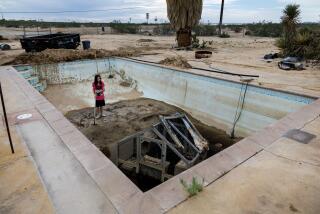Damage May Push Poor Families Into Ranks of Homeless
YUCCA VALLEY, Calif. â For Dana and Tina Hand, the parents of three small children, the transition from mere poverty to homelessness and desperation was surprisingly abrupt--the mere 30 seconds or so it took for Sundayâs earthquake to rumble through their townhouse apartment.
Besides depriving them of a home they consider safe, the quake and subsequent aftershocks have also undermined the foundation of the familyâs precarious existence, forcing them to sleep outside, seek donations and wonder about their future.
âWe donât know what weâre going to do,â said a shaken Tina Hand, showing a visitor the outdoor picnic table that serves as a kitchen and the tent that is now her childrenâs bedroom. âIâm feeling hopeless, and helpless,â she said, tears welling in her eyes. âItâs like everything is coming down at once.â
While the temblors forced hundreds from their homes in the High Desert area, many have alternatives: They can rebuild, stay with relatives or friends or move back to principal residences elsewhere. But for the Hands and other poor families who have no place else to go, the earthquake means calamity of a lasting sort.
âWhat are all these people going to do once the âemergencyâ is over?â asked Susan Christiansen, a volunteer at a Red Cross shelter that provides meals for 3,000 people a day and sleeping accommodations for about 50 a night. âThe problems arenât going to go away.â
Aftershocks have worsened the condition of already damaged buildings. Just to keep up with inspections, the town of Yucca Valley, with a population of 25,000, recently upped its housing staff tenfold--from one to 10 inspectors. Repairs are likely to take months.
At the damaged Sunwest Villas, a low-income, 50-unit apartment complex, the question of where to go next has become a major preoccupation for the Hands and their neighbors. Many subsist on public assistance.
Many apartments suffered substantial damage. The quake cracked walls and window sills, shifted doors and warped floors. About a dozen families, including the Hands, are camping out on patios, in parking areas and amid the brush.
Deepening their worries, residents say, the apartment buildingâs management is demanding July rent payments and has told them they will lose their deposits if they donât pay. Deposits on the apartments, averaging about $200, are a substantial sum for the poor families here. All are afraid of being evicted.
Ernie Day, the apartment manager, declined to comment on what would happen to those who do not pay their rent. He said inspectors told him the buildings were safe, though his wife, Pat Day, said she felt more secure sleeping in the family van.
âI donât want to lose my deposit, but Iâm not going to let my kids sleep in there,â said Angela LaPaglia, a 31-year-old mother of a 2-month-old boy and a 4 1/2-year-old girl who is physically disabled.
Since Sunday, the LaPaglias have been spending nights in the family pickup. The baby sleeps on a car seat in the cab while mother and child sleep in the rear. On Wednesday, as LaPaglia fed her daughter under a tree, her infant son rested nearby in a white bassinet.
âTo tell you the truth,â LaPaglia said, âwe donât know what weâre going to do.â
Tina Hand, who studies nursing at a nearby college, had taken the summer off to spend more time with her children--not anticipating that she would be consumed by trying to prevent them from catching colds in the chilly desert night or suffering sunburns from exposure during the day.
âI was looking forward to taking them out, going to the beach with them this summer,â she said Wednesday, as she held Nikki, 6, and rested on the back of her station wagon. âThese children are my life. Without them, I got nothing. . . . But this isnât living. This is hell.â
More to Read
Sign up for Essential California
The most important California stories and recommendations in your inbox every morning.
You may occasionally receive promotional content from the Los Angeles Times.









